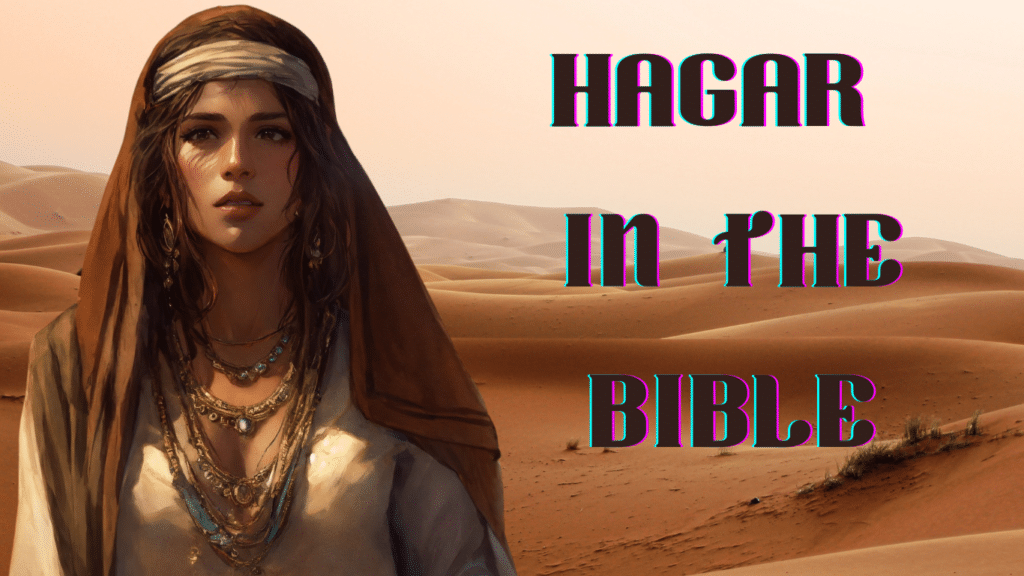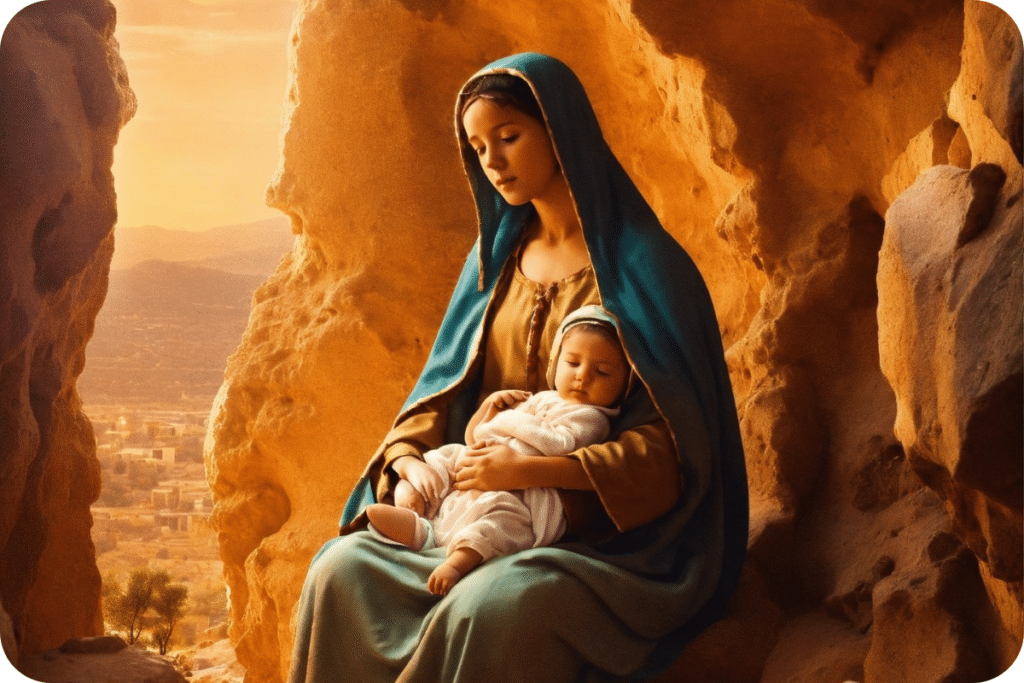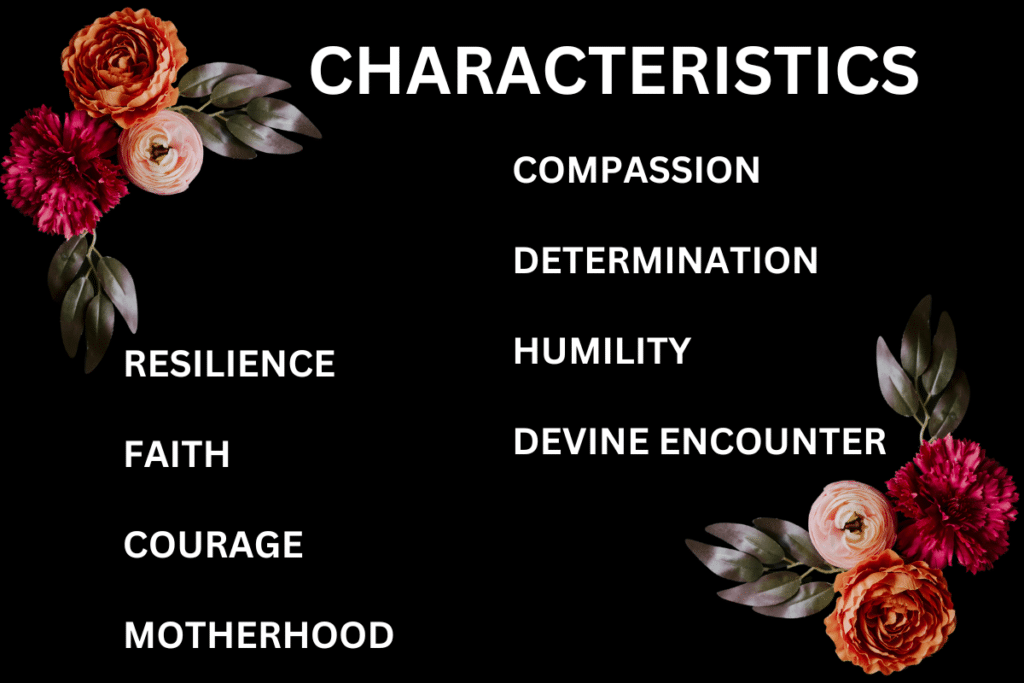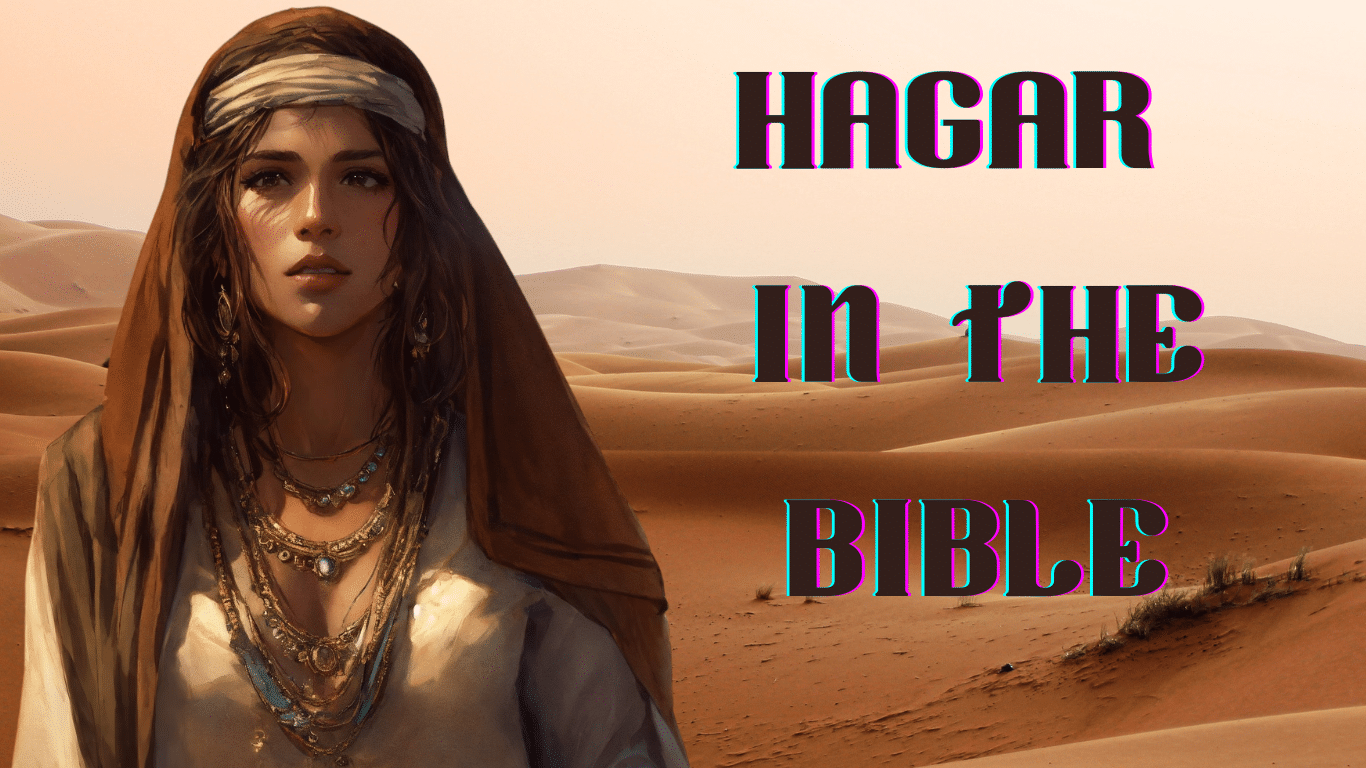HARDSHIP HAGAR IN THE BIBLE
Who was Hagar ?
According to the Bible, Hagar was the Egyptian slave and maidservant of Sarah. Hagar means Flight or Forsaken. She was the progenitor of the Ishmaelites, called as Arabs. And she plays a crucial role in the unfolding of God’s plan. From her humble beginnings as a maidservant to her pivotal role in the lineage of Abraham, Hagar’s life is one of resilience, faith, and divine intervention.

Role of Hagar in the Bible
Hagar’s story in the Bible is marked by both hardship and triumph. Initially, she is conceived as a surrogate for Sarah, who cannot bear children. Hagar’s pregnancy leads to tension with Sarah, and she is mistreated, ultimately fleeing into the wilderness. There, she encounters the Angel of the Lord, who comforts and guides her, promising that her son Ishmael will be the father of a great nation.
Despite being sent away by Abraham and facing further hardship, Hagar’s faith and resilience are evident throughout her journey. Her experiences shape her identity and purpose, ultimately leading her to name God as the “God Who Sees Me” and to find solace in His promises.
Hagar’s Relationship with Abraham and Sarah
The relationship between Hagar, Abraham, and Sarah in the Bible is complex and fraught with tension. When Sarah is unable to conceive, she offers her Egyptian slave Hagar to Abraham as a surrogate mother. This arrangement leads to emotional turmoil as Hagar becomes pregnant and begins to look down upon Sarah.
Conflict erupts, and Sarah mistreats Hagar, causing her to flee into the wilderness. God intervenes, promising Hagar that her son Ishmael will become a great nation. Years later, Sarah gives birth to Isaac, and the tension resurfaces. At Sarah’s insistence, Abraham sends Hagar and Ishmael away, but God remains faithful to them in the wilderness.
Hagar’s Encounter with the Angel
Gen 16:7-14: “Now the Angel of the LORD found Hagar by a spring of water in the desert— the spring along the road to Shur. “Hagar, servant of Sarai,” He said, “where have you come from, and where are you going?” “I am running away from my mistress Sarai,” she replied. So the Angel of the LORD told her, “Return to your mistress and submit to her authority.” Then the Angel added, “I will greatly multiply your offspring so that they will be too numerous to count.
” The Angel of the LORD proceeded: “Behold, you have conceived and will bear a son. And you shall name him Ishmael, for the LORD has heard your cry of affliction. He will be a wild donkey of a man, and his hand will be against everyone, and everyone’s hand against him; he will live in hostility toward all his brothers.” So Hagar in the Bible gave this name to the LORD who had spoken to her: “You are the God who sees me,” for she said, “Here I have seen the One who sees me!” Therefore the well was called Beer- lahai- roi. It is located between Kadesh and Bered.”
Hagar in the Bible ; Her Return
Following her wilderness ordeal, Hagar in the Bible returns to Abraham’s household with her faith reaffirmed and her resolve strengthened. Her reunion with Abraham and Sarah marks a turning point in her journey, symbolizing reconciliation and renewal. Hagar’s encounter with God in the wilderness had given her a new perspective and a deeper understanding of her own worth.

She had been seen and heard by God, and this experience had transformed her. Upon her return, Hagar’s presence in the household is no longer marked by the tension and conflict that had previously characterized her relationship with Sarah. Instead, she is now a symbol of hope and redemption, reminding all of the power of God’s intervention in human lives.
Birth of Ishmael
And Hagar bore Abram a son. And Abram called his son’s name, whom Hagar bore, Ishmael. 16 And Abram was 86 years old when Hagar bore Ishmael to Abram. Gen:16:15-16Hagar gives birth to Ishmael, fulfilling God’s promise to Abraham. Despite the complexities surrounding Ishmael’s birth, he becomes a significant figure in his own right, destined to father a great nation.
Ishmael is circumcised with Abraham as a sign of the covenant with God, and God reaffirms his promise to make Ishmael into a great nation. Ishmael’s descendants include the Arabs and the Bedouin peoples, and his legacy extends to the founder of Islam, Muhammad. Through Ishmael, God demonstrates his faithfulness to his promises, even in the face of human conflict and uncertainty.
The Legacy of Hagar in the Bible
The legacy of Hagar in the Bible extends beyond her own story, influencing subsequent generations and shaping religious traditions. Her courage and faith serve as a source of inspiration for believers of all backgrounds.Throughout her journey, she demonstrates unwavering strength and resilience, confronting challenges with grace and determination. Her willingness to endure hardship and maintain her trust in God’s providence serves as a powerful example for believers of all backgrounds.
Through her story, Hagar in the Bible reminds us that no matter our circumstances, we can find strength and hope in our faith, and that our legacy can have a lasting impact on future generations.
Significance in Modern Context
In today’s society, where issues of social justice, women’s rights, and immigration are at the forefront of public discourse, Hagar’s life offers valuable insights and lessons. Her experience as a marginalized woman, subjected to mistreatment and exploitation, sheds light on the ongoing struggles faced by women around the world who are marginalized and oppressed.
Hagar’s significance in modern context lies in her ability to speak to the universal human experience of struggle, resilience, and faith. Her story resonates with individuals from all walks of life, offering hope and inspiration in the face of adversity. As we reflect on her narrative, we are reminded of the enduring relevance of biblical wisdom and the timeless truths it contains.
Lessons From Hagar in the Bible
Hagar’s life offers several lessons, such as resilience in the face of adversity, faith in uncertain circumstances, and the importance of trusting in a higher power even when things seem bleak. She demonstrates the strength to endure hardships, the courage to confront challenges, and the wisdom to find hope in unexpected places.
From Hagar in the Bible, there are several lessons we can learn:
- Trust in God’s Promises: Hagar in the Bible teaches us to trust in the promises of God, even when circumstances seem bleak. Despite being cast out into the wilderness, she trusted that God would provide for her and her son Ishmael.
- Perseverance in Adversity: Hagar’s resilience in the face of hardship teaches us the importance of perseverance. Despite facing mistreatment and abandonment, she continued to press on and seek solutions for herself and her son.
- Faithfulness Amidst Uncertainty: Hagar’s story reminds us that faithfulness to God can shine even in the midst of uncertainty. She remained faithful to God’s guidance and promises, even when her situation seemed dire.
- Compassion and Care: Hagar’s role as a loving mother to Ishmael demonstrates the importance of compassion and care, especially in difficult circumstances. She prioritized the well-being of her son and took action to protect and provide for him.
- Submission with Boundaries: While Hagar in the Bible initially submitted to Sarai’s authority, her story also teaches us the importance of setting boundaries and standing up for oneself when faced with mistreatment or injustice.
Overall, The story of Hagar in the Bible offers valuable lessons in faith, perseverance, compassion, and resilience that are relevant for our lives today.
Characteristics of Hagar in the Bible

Hagar in the Bible characteristics play a crucial role in the unfolding of God’s plan.
1. Resilience: One of Hagar’s most prominent characteristics is her resilience in the face of adversity. Despite being mistreated and marginalized, she demonstrates remarkable strength and perseverance, enduring hardships with grace and fortitude.
2. Faith: Throughout her journey, Hagar exhibits a deep faith in God’s providence. Even in moments of desperation and uncertainty, she trusts in God’s promises and remains steadfast in her belief that He will guide and protect her.
3. Courage: Hagar’s courage is evident in her willingness to confront challenges head-on, whether it be standing up to Sarah’s mistreatment or navigating the wilderness alone. Her bravery in the face of daunting circumstances serves as an inspiration to believers.
4. Motherhood: Hagar in the Bible is depicted as a caring and protective mother to her son Ishmael, even in the midst of uncertainty and instability.
5. Compassion: Despite her own struggles, Hagar in the Bible shows compassion towards others, particularly towards her son Ishmael. She cares for him deeply and is willing to sacrifice her own well-being for his sake, demonstrating her maternal instincts and love.
6. Determination: Hagar’s determination to secure a future for herself and her son drives her actions throughout the narrative. She refuses to be defined by her circumstances and takes proactive steps to shape her destiny, even in the midst of adversity.
7. Humility: Despite her role as a surrogate mother to Abraham’s child, Hagar in the Bible remains humble and submissive, recognizing her place within the household hierarchy. Her humility is reflected in her willingness to obey God’s commands and submit to His will.
8. Divine Encounter: Perhaps one of the most significant aspects of Hagar’s character is her encounter with the angel of the Lord in the wilderness. This divine interaction not only reinforces her faith but also serves as a pivotal moment in her journey, shaping her understanding of God’s plan for her life.
Overall, the Characteristics of Hagar in the Bible paint a portrait of a woman who, despite facing numerous challenges and hardships, remains steadfast in her faith and resilient in her pursuit of God’s will. Her story serves as a testament to the transformative power of faith and the enduring presence of God’s grace in the lives of His people.
Conclusion
The story of Hagar in the Bible is a powerful testament to the resilience of the human spirit and the faithfulness of God’s promises. Despite facing abandonment, abuse, and trauma, Hagar finds solace in her encounters with God. Her story highlights the importance of empathy, compassion, and trust in divine providence. Through her journey, we see how God meets Hagar in the wilderness, assuring her that she will be the mother of a great nation and that her son will be independent and free. This narrative serves as a reminder that even in the midst of pain and uncertainty, God remains faithful and that our experiences can be transformed into opportunities for growth and empowerment.
Reference
https://berean.bible/links.htm
FAQs (Frequently Asked Question)
- Was Hagar a slave in the Bible?
- While Hagar was a servant in Abraham’s household, the extent of her status as a slave is debated among scholars. Some interpret her as a concubine, while others view her as a slave.
- What is the significance of Hagar’s encounter with the angel?
- Hagar’s encounter with the angel represents divine intervention and guidance in her time of need. It underscores the theme of God’s presence and provision in moments of crisis.
- How does Hagar’s story relate to contemporary issues?
- Hagar’s story resonates with contemporary issues such as immigration, displacement, and women’s rights. Her experiences highlight the struggles faced by marginalized individuals and the importance of empathy and compassion.
- Why is Hagar’s story important in religious traditions?
- Hagar’s story holds significance in Judaism, Christianity, and Islam, serving as a shared narrative that unites these faiths. Her inclusion in religious texts underscores the universality of human experiences and the interconnectedness of diverse cultures.
- What lessons can we learn from Hagar’s story?
- Hagar’s story teaches us about the power of resilience, faith, and perseverance in the face of adversity. Her journey inspires us to trust in divine providence and to remain steadfast in our beliefs, even in the most challenging circumstances.


1 thought on “4. HARDSHIP HAGAR IN THE BIBLE”